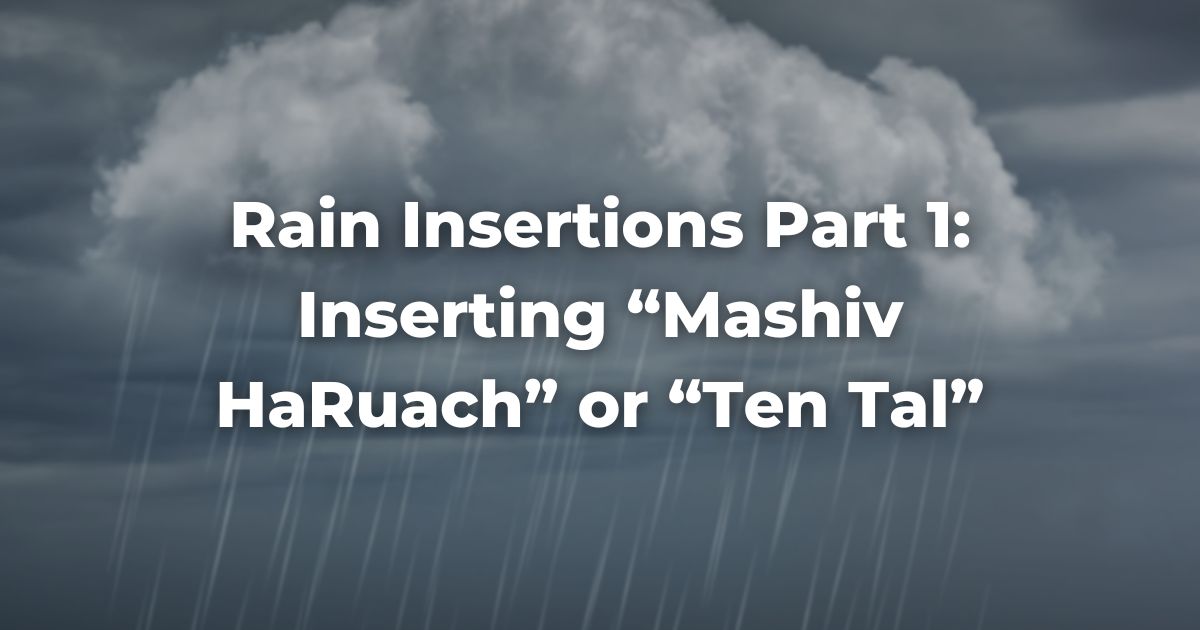Throughout the Jewish year, there are two insertions in daily tefilah, prayer, to ask for rain. Why are there two, and why do they fall on two different dates—one tied to the Jewish calendar, and one tied to the Gregorian calendar?
In the five articles included in this series on rain insertions in Jewish prayer, I will explore the history of this practice, which builds the rhythms of the natural world into our modern lives.
What are the two rain insertions in Jewish prayer?
The Jewish calendar is rooted in the agricultural cycle of the land of Israel. The three major pilgrimage holidays—Passover, Shavuot, and Sukkot—are harvest festivals. Passover marks first barley harvest in the spring, Shavuot marks the wheat harvest in the summer, and Sukkot marking the end of the harvest period—the beginning of winter.
Sukkot, which closes out the harvest period, is the Torah’s great celebration of abundance. For a whole week, we gather together in Jerusalem, feast, and offer to God a staggering total of 70 bulls as an expression of gratitude for the abundance we’ve received throughout the harvest. Throughout the Bible, the number 70 stands in for the idea of magnitude—this is a lot of bulls!
But we don’t stop there: after seven days of celebration, we add on another holiday! This is when we first insert rain into our prayer. Shmini Atzeret may be the least known holiday in the Jewish year. It’s significant almost solely for the change it makes in our tefilah: on Shmini Atzeret we begin to insert the line “Mashiv HaRuach uMorid HaGashem,” “He makes the wind blow and the rain fall” into our Amidah, the central prayer of the Jewish liturgy.
It is no mistake that right after Sukkot, a celebration of the fruit of the earth, Shmini Atzeret turns our eyes to the sky. The summer is passing away and winter, the rainy season in the land of Israel, will soon begin in earnest. There are no major Jewish holidays during the rainy season, however essential it is to seasonal and agricultural cycles. It is only saying “Mashiv HaRuach” that keeps us connected to that natural context.
And yet, despite its connection to the agricultural cycle, Mashiv HaRuach is not a request for rain. It is purely an acknowledgement of God’s power over the rain. On Shabbat, we do not make personal requests of God; the entire structure of the Amidah changes to remove petitionary prayers. But even on Shabbat, we say Mashiv HaRuach.
It is particularly striking, then, that we do add a true request for rain into the Amidah later in the year, on December 4th (or 5th), into the blessing called Birkat HaShanim. So why do we have two insertions instead of one? Why are they said at such different times? Why is one linked to a Gregorian date, the only Gregorian date on the Jewish calendar? And why do Jews of the diaspora need to think about Israeli agriculture at all?
Origins in the MishnaA collection of rabbinic teachings edited in Israel around 225 CE. Organized in six sedaraim by subject matter and dealing with both ritual and civil law. Both the Jerusalem and Babylonian Talmud are expansive discussions of the Mishnah. Read more
Already in our earliest sources—the mishna (masechet Taanit)—we see ambiguity about these two insertions. The mishna begins with the question “?מֵאֵימָתַי מַזְכִּירִין גְּבוּרוֹת גְּשָׁמִים”, “When do start mentioning the might of the rains?” This clearly refers to a prayer insertion, but which one: Mentioning rain (הזכרת גשמים) by saying Mashiv HaRuach on Shmini Atzeret or requesting rain (שאילת גשמים) by saying Ten Tal uMatar on December 4th/5th?
In the disagreement which answers this mishna’s question, Rabbi Eliezer and Rabbi Yehoshua seem to be just as confused as us:
Rabbi Eliezer says: On the first yom tov, holiday, of Sukkot. Rabbi Yehoshua says: On the last yom tov of Sukkot [Shemini Atzeret]. Rabbi Yehoshua said to him: Since rain is a sign of a curse on Sukkot, why should you mention it on Sukkot? Rabbi Eliezer said to him: I did not say one should request rain, rather one should mention, “He makes the wind blow and the rain fall in its time” [משיב הרוח ומוריד בגשם בעיתו]. He responded: If so, then one should always mention rain!
Rabbi Yehoshua objects to starting at the beginning of Sukkot, because rain at that time is not beneficial—it means you can’t eat in your sukkah, and your harvest might spoil! Rabbi Eliezer has to clarify that his opinion is only about mentioning (Mashiv HaRuach) and not requesting (Ten Tal).
Because Rabbi Eliezer has to clarify this, we see that Ten Tal, which today we insert in December, was not fixed in Rabbi Eliezer’s day—otherwise he would not have had to clarify. Furthermore, Rabbi Yehoshua suggests that “mentioning” is the same thing as “requesting,” since he rejects Rabbi Eliezer’s distinction as implausible: you either request rain or you don’t, he says; there’s no middle ground.
The mishna’s question seems to precede the distinction between the two insertions, and even to precede any fixed liturgy. Originally, perhaps everyone would decide how to pray for rain in their own way. Rabbi Eliezer may be creating the distinction for the first time, and he may also be the origin of the wording for Mashiv HaRuach.
This leads to a rather strange conclusion: Although we follow Rabbi Yehoshua’s timing (Shmini Atzeret), we follow Rabbi Eliezer’s logic and language—a mention, not a plea. Only later was another insertion devised as an explicit request, since it was only needed once the two possibilities were disambiguated.
(Note: This reading would certainly explain the next mishna which begins with the statement: “אֵין שׁוֹאֲלִין אֶת הַגְּשָׁמִים אֶלָּא סָמוּךְ לַגְּשָׁמִים,” “one requests rain only immediately preceding the rainy season,” but goes on to clearly discuss the insertion which is made today on Shmini Atzeret. Also see Taanit 4a).
That split reveals the ways that Jewish tradition preserves minority opinions.
In the next essay, we’ll ask a more profound question: why do we bring up rain at all—what does rain mean to us?
Read on: Rain Insertions Part 2: Theology and a Talmudic Reading
Author
-

Nadav Elovitz has been involved in Jewish communities and TorahRefers to the first five books of the Hebrew Bible, the Tanakh, also called the Five Books of Moses, Pentateuch or the Hebrew equivalent, Humash. This is also called the Written Torah. The term may also refer to teachings that expound on Jewish tradition. Read more learning throughout his life. He has been a gabbai in the past but has never had any official credentials, though he is interested in a wide variety of topics related to Torah and the Jewish tradition. He is from the Boston area and works as an engineer by day.
View all posts




